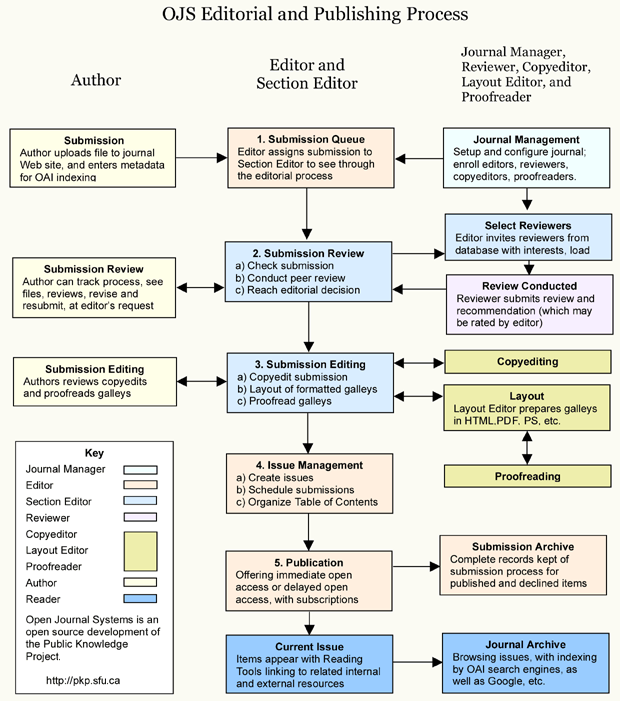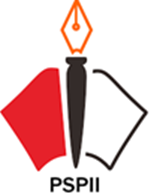- Focus and Scope
- Section Policies
- Peer Review Process
- Open Access Policy
- Archiving
- Publication Ethics
- Publishing System
- Plagiarism Checker
- Open Access Policy
- Indexing
Focus and Scope
Focus:
Jurnal Inovasi Pendidikan Agama Islam (JIPAI) provides readers with a better insight into the theory and practice and development of Islamic religious education.
Scopes:
Jurnal Inovasi Pendidikan Agama Islam (JIPAI) specializes in inter, multi and transdisciplinary studies of Islamic religious education in its various components in theory, practice and development in both formal and non-formal educational institutions.
Section Policies
Articles
Peer Review Process
Peer review helps editors in making editorial decisions and through editorial communication with authors can also help authors in improving papers.
Manuscript articles submitted online to the Journal of Islamic Religious Education Innovation (JIPAI) will be checked by the editorial board regarding scope, in-house style, plagiarism. Manuscripts that meet the focus and scope of the Journal of Islamic Education will proceed to a review process which will at least be reviewed by a reviewer with a double blind commitment, and by two reviewers. Reviewers are journal partners consisting of experts who are concentrated in the journal field. The editor will send an email to the selected reviewers regarding the title and contents of the manuscript, as well as an invitation to log in to the journal website to complete the review process. Reviewers log in to the journal website to agree to conduct a review, download the manuscript, submit comments, and select recommendations. The review process by reviewers is carried out at least one month. The results will be returned to the author for follow-up. Eligible papers will be published in English.
Speed
Any selected referee who feels unqualified to review the research reported in a manuscript or knows that prompt review is not possible should notify the editor and seek permission from the review process.
Confidentiality
Any manuscript received for review must be treated as a confidential document. The document may not be shown or discussed with others except with the permission of the editor.
Objectivity Standards
The review must be conducted objectively. Personal criticism of the author is inappropriate. The referee must express his views clearly with supporting arguments.
Source Acknowledgment
Reviewers should identify relevant published work that has not been cited by the author. Any statement that an observation, derivation, or argument has been reported previously should be accompanied by relevant citations. A reviewer should also draw the editor's attention if there are substantial similarities or overlaps between the manuscript under consideration and other published papers of which they are personally aware.
Disclosure and Conflicts of Interest
Privileged information or ideas obtained through peer review must be kept confidential and not used for personal gain. Reviewers should not consider manuscripts that have conflicts of interest resulting from competitive, collaborative, or other relationships or connections with any authors, companies, or institutions associated with the paper.
Open Access Policy
This journal provides immediate open access to its content on the principle that making research freely available to the public supports a greater global exchange of knowledge.
Archiving
This journal utilizes the LOCKSS system to create a distributed archiving system among participating libraries and permits those libraries to create permanent archives of the journal for purposes of preservation and restoration. More...
Publication Ethics
Jurnal Inovasi Pendidikan Agama Islam (JIPAI) is a peer-reviewed journal published by the Postgraduate Islamic Religious Education Study Program (PAI) at UIN Sunan Gunung Djati Bandung. This statement clarifies the ethical behavior of all parties involved in the act of posting an article in this journal, including the author, the chief editor, the Editorial Board, the peer-reviewed and the publisher. This statement based on COPE’s Best Practice Guidelines for Journal Editors.
Ethical Guideline for Journal Publication
The publication of an article in Jurnal Inovasi Pendidikan Agama Islam (JIPAI) is an important building block in the development of a coherent and respected network of knowledge. This is a direct reflection of the quality of the work of the authors and the institutions that support them. Peer-reviewed articles support and embody the scientific method. It is therefore important to agree on standards of expected ethical behavior for all parties involved in the act of publishing: authors, journal editors, peer reviewers, publishers and the public.
Islamic religious education laboratory, Faculty of Tarbiyah and Teacher Training as publisher of Jurnal Inovasi Pendidikan Agama Islam (JIPAI) takes its duties of guardianship over all stages of publishing exceptionally seriously, and we recognize our ethical and other responsibilities. We are committed to ensuring that advertising, reprint or additional commercial revenue has no impact or influence on editorial decisions. Besides, the Islamic religious education laboratory, UIN Sunan Gunung Djati Bandung, and the Editorial Board will assist in communications with other journals and publishers where this is useful and necessary.
Publication decisions
The editor of the Jurnal Inovasi Pendidikan Agama Islam (JIPAI) is responsible for deciding which of the articles submitted to the journal should publish. The validation of the work in question and its importance to researchers and readers must always drive such decisions. The editors may be guided by the policies of the journal's editorial board and constrained by such legal requirements as shall then be in force regarding libel, copyright infringement and plagiarism. The editors may confer with other editors or reviewers in making this decision.
Fair play
An editor at any time evaluates manuscripts for their intellectual content without regard to race, gender, sexual orientation, religious belief, ethnic origin, citizenship, or political philosophy of the authors.
Confidentiality
The editor and any editorial staff must not disclose any information about a submitted manuscript to anyone other than the corresponding author, reviewers, potential reviewers, other editorial advisers, and the publisher, as appropriate.
Disclosure and conflicts of interest
Unpublished materials disclosed in a submitted manuscript must not use in an editor's research without the express written consent of the author.
Duties of Reviewers
Contribution to Editorial Decisions
Peer review assists the editor in making editorial decisions and through the editorial communications with the author may also help the author in improving the paper.
Promptness
Any selected referee who feels unqualified to review the research reported in a manuscript or knows that its prompt review will be impossible should notify the editor and excuse himself from the review process.
Confidentiality
Any manuscripts received for review must treat as confidential documents. They must not be shown to or discussed with others except as authorized by the editor.
Standards of Objectivity
Reviews should conduct objectively. Personal criticism of the author is inappropriate. Referees should express their views clearly with supporting arguments.
Acknowledgement of Sources
Reviewers should identify relevant published work that has not been cited by the authors. Any statement that an observation, derivation, or argument reported should accompany by the appropriate citation. A reviewer should also call to the editor's attention any substantial similarity or overlap between the manuscript under consideration and any other published paper of which they have personal knowledge.
Disclosure and Conflict of Interest
Privileged information or ideas obtained through peer review must be kept confidential and not used for personal advantage. Reviewers should not consider manuscripts in which they have conflicts of interest resulting from competitive, collaborative, or other relationships or connections with any of the authors, companies, or institutions connected to the papers.
Duties of Authors
Reporting standards
Authors of reports of original research should present an accurate account of the work performed as well as an objective discussion of its significance. Underlying data should be represented accurately in the paper. A paper should contain sufficient detail and references to permit others to replicate the work. Fraudulent or knowingly inaccurate statements constitute unethical behavior and are unacceptable.
Data Access and Retention
Authors are asked to provide the raw data in connection with a paper for editorial review, and should be prepared to provide public access to such data (consistent with the ALPSP-STM Statement on Data and Databases), if practicable, and should in any event be prepared to retain such data for a reasonable time after publication.
Originality and Plagiarism
The authors should ensure that they have written entirely original actions and if the authors have used the works, or words of others that this has appropriately cited or quoted.
Multiple, Redundant or Concurrent Publication
An author should not, in general, publish manuscripts describing essentially the same research in more than one journal or primary publication. Submitting the same paper concurrently to more than one journal constitutes unethical publishing behavior and is unacceptable.
Acknowledgement of Sources
Proper acknowledgment of the work of others must always be given. Authors should cite publications that have been influential in determining the nature of the reported work.
Authorship of the Paper
Authorship should be limited to those who have made a significant contribution to the conception, design, execution, or interpretation of the reported study. All those who have made significant contributions should be listed as co-authors. Where there are others who have participated in certain substantive aspects of the research project, they should be acknowledged or listed as contributors. The corresponding author should ensure that all appropriate co-authors and no inappropriate co-authors are included on the paper and that all co-authors have seen and approved the final version of the article and have agreed to its submission for publication.
Fundamental errors in published works
When an author discovers a significant error or inaccuracy in his self-published work, it is the author's obligation to immediately notify the editor of the journal or publisher and cooperate with the editor to retract or correct the paper.
Publishing System

Open Access Policy
This journal provides immediate open access to its content on the principle that making research freely available to the public supports a greater global exchange of knowledge.
Indexing
was indexed in:
- doi Crossref
- Moraref
- Dimensions
- ROAD
- Google Scholar
- GARUDA
- BASE











